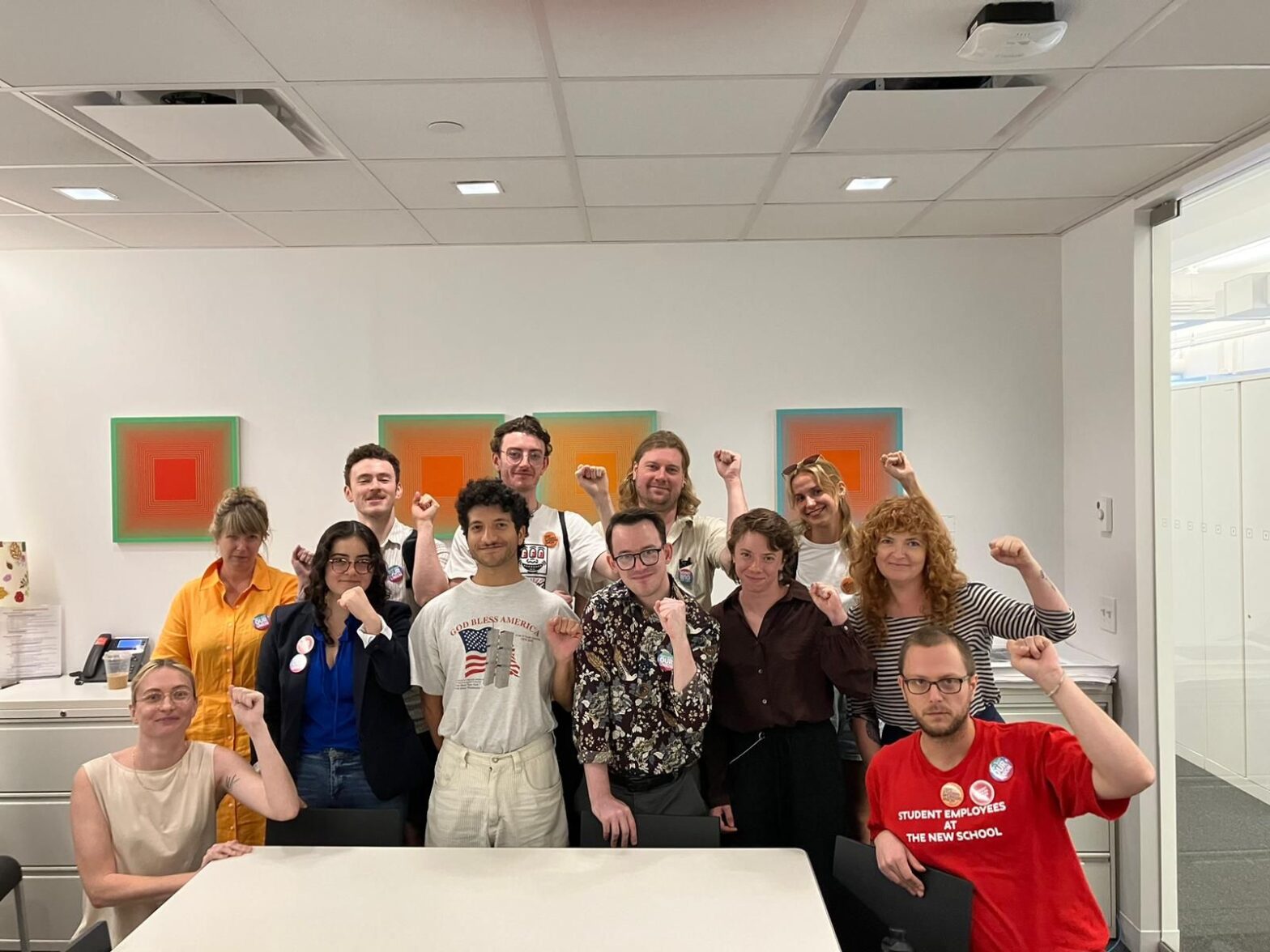“Extremely frustrating.”
That’s how bargaining committee members of SENS, the unit representing The New School’s academic student workers in the ACT-UAW Local 7902 union, describe the process of negotiating their new contract with the university. The group, whose last contract expired on Aug. 31, has held seven bargaining sessions with The New School since mid-July.
A major reason why members say they have found the process so frustrating is because the university has not been actively engaging with or bargaining over the majority of the 26 proposals SENS has put forth, including those members say are most important to them.
Those include proposals for tuition waivers, an improved healthcare plan, new anti-bullying measures, and childcare coverage, which SENS bargaining committee member Aaron Berman described as addressing “the most pressing issues in our lives.”
“They claim that they won’t respond until we have issued them all of our proposals,” said Zoe Carey, the President of Local 7902, after SENS’s fourth bargaining session. “That’s not really how bargaining works. If they want to be bargaining in good faith, they have to…give us counter proposals.” In more recent sessions, some contentious back and forth on select proposals between the university and the union has occurred, with the university offering seven written counter proposals and few minor tentative agreements reached between the two parties. On Oct. 27, the two parties decided they would come to agreement on all non-economic proposals prior to bargaining on economic ones.
The university presented an initial full contract proposal to SENS on July 17, the first day of bargaining. In a statement provided to The New School Free Press, the university characterized this complete economic proposal as one “that includes significant wage and benefits enhancements, such as a 29% pay increase over the life of the contract.”
“If inflation… follows the same pattern that it has over the last six years, then this 29% increase is barely going to be a real wage increase by the end of the contract. It’s not going to solve any of the financial problems that academic student workers have,” Berman said.
The union presented their own counter proposal for a compensation package on Oct. 27. It includes a 40% raise in the first year of their contract, a subsequent 13.5% raise in years two and three, fees paid to workers for curriculum development, and a new minimum pay rate of $25/hour for any new positions.
“We are highly skilled workers with a ton of training,” he said. “We shouldn’t be in a position where the majority of our members are earning under $20,000 a year,” which is the case under the current contract.
Berman said that the majority of SENS members are graduate students in their mid twenties to mid thirties. As graduate students, they have to pay a fee to maintain their status at the university even when they’re not taking courses and are solely working on a thesis. For the majority of Masters students, this fee is typically $200 a year. For most PhD students, it’s typically over $2,600 a year.
“That’s a significant portion of my wages,” said Berman, who is a PhD student. “We don’t feel like we should have to pay in order to have the privilege to work.”
The union has introduced a proposal to be included in the university’s tuition waiver program, which, if adopted into their contract, would apply to status maintenance fees and any courses necessary for their degree.
Paying the university back a portion of their wages is a major concern for SENS members. According to Berman, a significant chunk of people depend solely on their paychecks to pay their bills. Members see portions of their paychecks return to the university not only through maintenance fees and tuition, but also through healthcare costs.
Therefore, the union has introduced a proposal for the university to cover 100% of their premiums. The proposal also asks for the development of a fund for dental and vision care, which are currently excluded from the university plan.
“We want to make sure that whatever we end up with in terms of a compensation packet that we’re not seeing a significant chunk of our pay heading right back to The New School through their student health insurance plan, which is just skyrocketing in costs,” Berman said.
SENS has also introduced new anti-bullying language that would provide workers with additional protections from unfair treatment in the workplace. Berman said that there are “many cases of bullying and unsafe work environments that occur not in relation to somebody’s protected status,” such as sex or race.
SENS has also introduced a proposal for the university to create an annual $90,000 childcare fund. In their plan, members with childcare expenses would each be able to receive up to $5,000 per semester from the fund.
“These are proposals that are connected not only to the academic student workers’ success as workers, but also as students,” Berman said. “They’re all aimed at addressing the kind of issues that lead to people taking a very long time to finish their degrees and having difficulty advancing.”
Despite the essential support the union said these proposals would provide them with, members said that the university has spent the majority of bargaining sessions not bargaining. Instead, they have spent the majority of the time either engaged in a prolonged dispute over bargaining ground rules (which was finally settled on Oct. 27) or asking minute questions about proposals that the union said had already been answered when members introduced them.
“If these issues aren’t solved, there will be no SENS workers. No one will be able to afford to live in New York City, pursue their studies, work, and teach at The New School any longer,” Berman said.







